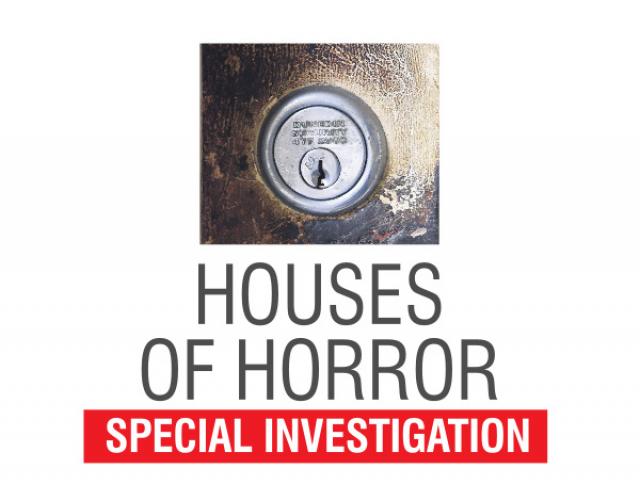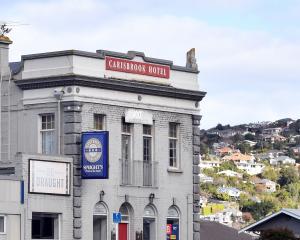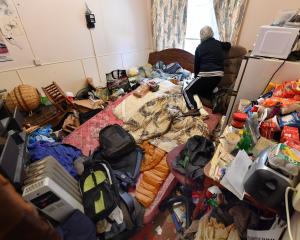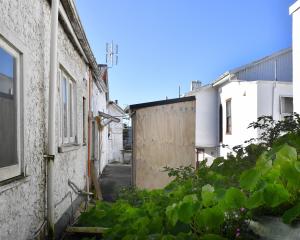
Deputy mayor Sophie Barker is also calling for Dunedin’s boarding houses to be "urgently" reviewed by the Dunedin City Council following the paper’s "shocking" revelations.
The ODT compiled a dossier of the 11 buildings and sent it to four government departments and the DCC — along with a call for immediate action to protect vulnerable people living within their crumbling walls.
A government team which undertakes tenancy law and healthy homes checks — the Tenancy Compliance and Investigation Team (TCIT) — will look into all 11 buildings, on behalf of the Ministry of Business, Innovation and Employment (MBIE).
More Dunedin boarding houses may remain hidden, but the number slated for MBIE checks is now far higher than the number recorded in a nationwide audit in June by MBIE.
Only one Dunedin boarding house was recorded in the audit, which asked councils to report only on three-storey buildings and focus on fire risk.

The audit was a government response to a fire in Wellington boarding house Loafers Lodge in April that killed five people. A man also died in a fire in a Dunedin boarding house in Phillips St last year.
The 11 boarding houses reported by the ODT to the government are not three-storey buildings and pose a multitude of risks to homeless people in them. Homelessness in New Zealand is defined as insecure housing, and includes people in boarding houses.
Responding to the ODT’s dossier, the MBIE said two boarding houses in Graham St and Kaikoura Valley Rd were under investigation.
Two more boarding houses in Great King St and High St were being slated for checks for the first time.
A further three in Hope St and High St — known to the TCIT but never investigated — were on a "list for assessment".
Another three in Maitland St not previously under investigation would be checked.
The Stafford Gables Hostel — exposed as a boarding house for the homeless by the ODT last month — would have a "reassessment to assess compliance" after "breaches" were found six months ago.
The hostel is the building the DCC reported to the MBIE’s national audit — because it has three storeys. The DCC reported a fire safety issue that had been remedied. Tenants no longer had access to a key that could silence the fire alarm.
An MBIE spokesperson said it recognised that "some of the most at-risk members of society live in boarding houses" and boarding houses were an important "focus area" for investigation.
The timings of the MBIE checks are unknown but will be sought by the ODT which will also continue to seek out boarding houses.
Last week, the paper found yet another delapidated boarding house with sick and elderly homeless people in it. An elderly woman who uses a walking frame only had indoor access to a near-derelict, unheated bathroom on the other side of the building.
The ODT informed the Ministry of Social Development — which said it was "discussing additional support we can offer her".
The DCC said it would respond to the ODT’s boarding house dossier later this week. Responses from other agencies, including the Ministry of Health, are also pending.
However, the MBIE said TCIT investigations were often done in partnership with other agencies, such as Fire and Emergency New Zealand and local councils.
Ms Barker called for the DCC to take a lead on investigating the standard of all boarding houses across the city.
"It seemed peculiar that only one Dunedin boarding house was reported to the government. The ODT’s work has exposed some appalling and shocking buildings. There must be an urgent review of them all," Cr Barker said.
Charity leaders say dangers faced by homeless people in boarding houses are multiple and include risk of self-neglect and harm from other vulnerable occupants’ behaviours, as well as building standard issues.
Sammy Russell from Sammy’s Care Packages, which distributes clothes to homeless people, said: "These back-alley buildings must be replaced with supported care in decent buildings.
"Vulnerable people are rotting in boarding houses, with constant knocks to their health and self-esteem, risking death including from suicide. For me, it comes back to the question if your child became homeless, would you want them here? These are really nasty places."
Homeless people the ODT spoke to as part of its homelessness investigation echoed community leaders’ calls — and said they were trying to speak out.
Jenny (name changed) was pointed by the Work and Income office to live at the former Carisbrook Hotel, a boarding house exposed by the ODT for its terrible standards. She moved out and rang the DCC to complain about the former hotel but says she "got nowhere".
"I asked to speak to someone but they said they weren’t sure who I should talk to. Something must be done about our shameful boarding houses.
"It has made me realise why people might commit crimes, because jail is safer than these buildings. They are just horrible, horrible. With few exceptions they are cold, damp, violent and traumatising."
A DCC spokesperson said people should contact the council if they felt they had information. Its building services team had a "regulatory role ensuring buildings are safe for people to use".










